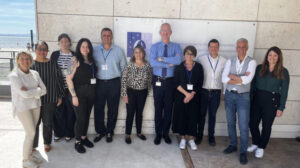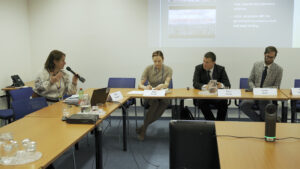Youth Organisations for Drug Action (YODA) is a European network that brings together organisations at the forefront of harm reduction and drug policy reform.
YODA convenes independent organisations that are formally registered in their home countries to cooperate on projects and to share knowledge and support. YODA focuses on Europe due to the region-specific challenges that People Who Use Drugs (PWUD) and drug policy activists face, and aims to affect European drug policies.
“We felt there is a need for an increased presence of the young Europeans in the policy processes on the international level, and I think we have managed to achieve that,” shared Jan Stola, co-founder and coordinator of YODA.
YODA began as a collaboration between two SSDP chapters, from the United Kingdom and from Poland, in 2011. Organisations from other countries quickly began to join, with the first coming from Italy and Denmark. Within two years, YODA had taken on a shape of its own, and Jan registered the organisation as a Polish foundation. In 2013, Jan began to travel around Europe, starting in the Balkans, to meet with potential new member organisations.
Six organisations came on board, one of which was Re Generation, a Serbian NGO that is focused on youth and drug use in nightlife settings. The organisation began as a group of friends active in nightlife settings who wanted to respond to the problems facing their community. Over time, in addition to providing services in nightlife settings and festivals, they have also begun to conduct research relating to drug use and young people in these settings, and to advocate for services based on their findings.
What distinguishes YODA from other organisations, such as Youth RISE and SSDP, covered in parts 1 and 2 of this series, is that it’s an umbrella organisation for NGOs that work with young PWUD. YODA isn’t university-based, and most members are groups rather than individuals.
“YODA doesn’t [provide drug-related] services… it focuses on capacity building for organisations who work on the national level,” shared Iga Jeziorska, Deputy Director of YODA. That said, young PWUD take part in many of YODA’s projects.
Since 2015, YODA has organised over 10 international workshops across Europe, bringing together 200+ participants from more than 20 countries and distinct organisations. Before workshops take place, YODA surveys its members to see what content is most interesting or useful for them. This ensures that these workshops are always “focused on the real-life challenges faced by our members, and young Europeans that they work with,” shared Jan.
For Re Generation, this training has been pivotal in elevating the organisation’s work, and “significantly raised our capacities in our organisation…We were young…and we were an organisation that had 5 or 6 people mostly, so we had to expand ourselves as well in order to bring all the people to trainings of YODA.”

Over time, more organisations have organically become interested in YODA’s work and have asked to join. YODA screens potential member organisations, primarily to ensure that their values are in line with YODA’s and that they work within the harm reduction paradigm. Currently, YODA represents 24 organisations from 24 countries. This growth has increased the network’s potential, as each member brings something different to the table.
“As YODA mostly [does] peer-to-peer capacity building, having more organisations in the network means having more skills around,” explained Irena. Additionally, as organisations focus on different types of drug use and different settings for drug use and services, “that means that there are a bigger number of skills and tools that people can learn from each other.”
As YODA grew, it quickly gained attention in the international arena, securing ECOSOC status or Consultative Status to the United Nations Economic and Social Council. This is the highest status that NGOs can attain in relation to the United Nations, which allows them to participate in UN activities. By 2015, YODA also joined the Civil Society Forum on Drugs.
“We are kind of recognised nowadays. Not only among NGOs but also among governments and international structures like the European Union [or Council of Europe] for example,” said Iga.
One of YODA’s main activities is bringing members to annual meetings of the United Nations Commission on Narcotic Drugs in Vienna. YODA’s activities at the CND are mostly to empower the member organisations to advocate on their own behalf, providing funding and access, and organising side events.

“They do their own job…we just enable them to get there, and to chase their national representatives who are not accessible, for example, in their home countries. So this is the only occasion that they have to actually get in contact with them, and tell them what are the needs of the organisations, what are the needs of People Who Use Drugs,” shared Iga, who has attended CND several times.
This international forum can be powerful for elevating organisations’ national advocacy even after CND concludes. Representatives from Re Generation have been attending CND since 2014, and their presentations there have attracted the attention of the Serbian government and granted them legitimacy in domestic policymaking.
“It really kind of brought our national government perspective in order to realise that if we are counted as an expert in international setting in regards to youth, then they gladly invited us later on to participate in the national debate around drugs,” explained Irena.
The organisations that form YODA are often unconnected when they join, and come from different regions and areas of drug policy, but they go on to work closely and collaboratively based on shared values.
“There is a certain line of closeness and connectivity among YODA members because, above all, we did spend hours, days and months in different countries working in different areas of drug use that naturally brings us more closer together, and then whenever we have the chance to spend more time together as a team building, we have the intention to do that,” shared Irena.

Apart from attending CND, organisations are also kept in the loop about other opportunities that may be of interest to them. The organisation’s funding sources prevent funding from being given to organisations for their country-level work. Any extra budget, however, can go to supporting anyone who wants to attend conferences.
YODA is currently coordinating civil society involvement in the 2021-2025 European Union Drug Strategy, through the Civil Society Forum on Drugs. Iga is in charge of the working group on the EU Drug Policy, wherein she advocates for the involvement of the youth perspective in the evaluation of the previous strategy and the new strategy’s drafting. Currently, the next EU Drug Strategy is being revised and amended under the leadership of the German presidency of the European Union.
Iga said that the original strategy was, “really focused on security and law enforcement…more than the previous one…And that’s why many actors have criticised it, that it’s a kind of step back.”
Though YODA has achieved an elevated status among drug policy organisations, YODA and its members are still subject to being underestimated because of their youth. While Iga feels that YODA has gained respect at the national level in the countries it works in, and at the international level in some fora, advocacy at the United Nations comes with unique challenges.
“I have the impression that it’s still like ‘oh, yeah, they come here, nice. So young, and they don’t know [anything],’” shared Iga.
“I think it’s changing,” she elaborated, “but we are not there yet.”
Looking forward, YODA would like to strengthen its relationships with youth groups from outside of Europe and collaborate, both within and outside of the drug policy movement. YODA also plans to host a conference focused on young people and drugs in Europe.
“What I want to achieve the most personally is to help young people involved in YODA to gain the skills and knowledge necessary to continue the work of our network when the current board will be leaving its positions in [a] few years,” shared Jan.
“We are trying to basically bring up the drug policy younglings to become professional advocates,” said Iga, summing up YODA’s mission.
Hannah Taylor






